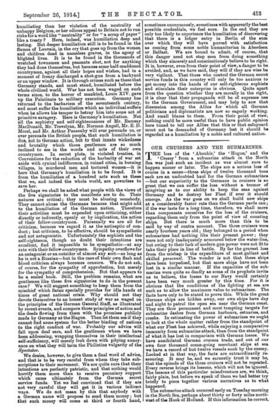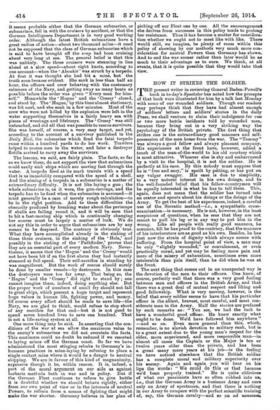OUR CRUISERS AND THE SUBMARINES. T HE loss of the Aboukir,'
the Hogue,' and the Cressy' from a submarine attack in the North Sea was just such an incident as was almost sure to happen sooner or later. The ships are a serious loss of course in a sense—three ships of twelve thousand tons each are an undoubted haul for the German submarines —but our superiority to the Germans in cruisers is so great that we can suffer the loss without a tremor of misgiving as to our ability to keep the seas against Germany and to destroy her Fleet if ever it should emerge. As the war goes on we shall build new ships at a considerably faster rate than the German yards can; if the war lasts for a, long time, therefore, we shall more than compensate ourselves for the loss of the cruisers, regarding them only from the point of view of counting ships. But there is much more than this to be said by way of contra account. The three cruisers were nearly fourteen years old ; they belonged to a period when submarines had nothing like their present power ; they were not only inadequately armoured below the water-line, but owing to their lack of modern gun-power were not fit to take their place in line of battle. By far the gravest loss from the mishap is the expenditure of most gallant and skilled personnel. The wonder is not that these ships have been torpedoed, but that more ships have not been lost in a similar manner. If the capacities of the sub- marine were quite so deadly as some of its prophets invite us to believe, the losses to our Navy would certainly have been very much greater by this time. For it is obvious that the conditions of the fighting at sea are such as to allow the maximum value to submarines. The facts have only to be stated to prove this. While the great German ships are hidden away, our own ships have day and night to patrol the open sea near the German coast. They are thus permanent and most tempting targets for submarine dashes from German harbours, estuaries, and creeks. In estimating the power of submarines we ought to look at the whole matter rather from the standpoint of what our Fleet has achieved, while enjoying a comparative immunity from submarine attack, than from the standpoint of what it has lost in comparison with German losses. We have annihilated German oversea trade, and out of our own four thousand ocean-going merchant ships at sea we have a record of but twelve vessels sunk by the enemy. Looked at in that way, the facts are extraordinarily re- assuring. It may be, and we earnestly trust it may be, that the episode of the three cruisers will not be repeated. Every reverse brings its lessons, which will not be ignored. The lessons of this particular misadventure are, we think, fairly plain, but before we speak of them we had better try briefly to piece together various narratives as to what happened. The submarine attack occurred early on Tuesday morning in the North Sea, perhaps about thirty or forty miles north- west of the Hook of Holland. If this information be correct, it seems probable either that the German submarine, or submarines, fell in with the cruisers by accident, or that the German Intelligence Department is in very good working order. Although the latest British submarines have a great radius of action—about two thousand miles—it need not be supposed that the class of German submarine which is said to have brought off the coup bad been cruising about very long at sea. The general belief is that this was unlikely. The three cruisers were steaming in line ahead at a slow speed—about eight knots, according to one account—when the Aboukir' was struck by a torpedo.
At first it was thought she had hit a mine, but the truth soon became evident. She sank in less than half an hour, the officers and crew behaving with the customary calmness of the Navy, and getting away as many boats as possible before the order was given " Every man for him- self." Meanwhile the Hogue' and the Cressy' closed, and stood by. The Hogue,' by this time almost stationary, was hit next, and she sank in a few minutes. Most of the crew who were not killed by the explosion were left in the water supporting themselves in a fairly heavy sea with pieces of wreckage and lifebuoys. The Cressy' was still untouched, and did all that was possible to rescue survivors.
She was herself, of course, a very easy target, and yet, according to the account of a survivor published in the Daily Mail, the submarine which fired the fatal torpedo came within a hundred yards to do her work. Trawlers helped to rescue men in the water, and later a destroyer flotilla arrived to carry away the survivors.
The lessons, we said, are fairly plain. The facts, so far as we know them, do not support the view that submarines could easily sink ships which are moving fast through the water. A torpedo fired at its mark travels with a speed that is as immobility compared with the speed of a shell.
And the aiming of a torpedo in a submarine is a matter of extraordinary difficulty. It is not like laying a gun ; the whole submarine is, as it were, the gun-carriage, and the torpedo has to be fired when the submarine is assumed—it must generally be a case of merely rough calculation—to be in the right position. Add to these difficulties the obscurity produced by breaking water about the periscope if shells are falling round it, and it will be seen that to hit a fast-moving ship which is continually changing her course must be largely a matter of luck. We do not say this in order to argue that submarines are by any means to be despised. The contrary is obviously true.
What they have accomplished already in the sinking of these three cruisers, in the sinking of the Hela,' and possibly in the sinking of the ' Pathfinder,' proves that they are an essential part of every modern Navy. Never- theless, it seems that the ' Hogue' and the Cressy' would not have been hit if on the first alarm they had instantly steamed at full speed. Their self-sacrifice in standing by was magnificent. But the work of rescue should surely be done by smaller vessels—by destroyers. In this case the destroyers were too far away. That being so, the ' Hogue' and the ' Cressy' did right to stand by ; one cannot imagine them, indeed, doing anything else. But the proper work of numbers of small fry should not fall to great ships, which present a huge target and represent huge values in human life, fighting power, and money. Of course every effort should be made to save life—the Navy, we are glad to think, would refuse to stop short of any sacrifice for that end—but it is not good to spend seven hundred lives to save one hundred. That is not a life-saving system at all.
One more thing may be said. In asserting that the con- ditions of the war at sea allow the maximum value to the enemy's submarines we did not overstate the facts. This maximum could no doubt be reduced if we resorted to laying mines off the German coast. So far we have administered the most stinging rebuke to Germany's in- humane practices in mine-laying by refusing to place a single contact mine where it would be a danger to neutral shipping. We are in favour of this kind of magnanimity, expensive though it be, within reason. It is, indeed, a part of the moral argument on our side as against barbaric methods both in war and in policy. But if the German Fleet continues to refuse to give battle it is doubtful whether we should behave rightly, either from our own point of view or in the interests of neutral Powers, to refrain from a means of fighting that might make the war shorter. Germany believes in her plan of picking off our Fleet one by one. All the encouragement she derives from successes in this policy tends to prolong her resistance. Thus it has become a matter for considera- tion whether we ought not to meet like with like. There would still, we imagine, be plenty of room within this policy of showing by our methods very much more con- sideration for neutral Powers than Germany has shown. And to end the war sooner rather than later would be as much to their advantage as to ours. We think, at all events, that it is quite possible that they would take that view.



































 Previous page
Previous page